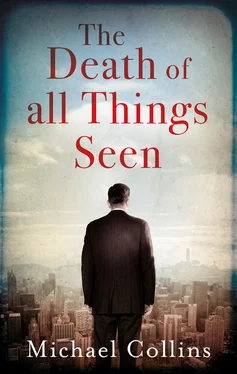She thought again of the hours running up to Walter’s departure earlier that morning and what a court would demand of her again, a reinvestigation into monies she had allegedly laundered for Walter in the grim years of a greater city corruption. It was come upon them again, the entanglement of her secrets with Walter’s, what had not yet, and might now, be discovered. She had survived it once, just barely. She couldn’t do it a second time.
She looked through a blur of tears, seeing again her own effigy seated by the small telephone table picked out so far back at the beginning of her marriage, listening to and then erasing each call from an attorney, then hearing the call from Dr Marchant’s office, the polite insistence of the voice asking her to come down on a Friday and in the late afternoon for a consultation. How was such a coincidence possible, such an alignment of Fates, this convergent sense of an ending?
No, Helen Price was not a religious woman, yet something was being asked of her, some grave and purposeful decision. She reached for her pills beside the subpoena. In opening the bottle, she tipped her head back, feeling the reflexive gag of self-preservation. She managed swallowing them, their effect almost immediate in the sudden euphoria of knowing how it would now end.
In the long corridor of her funneling exit, in the falling snow, she headed south on Columbia. Driving parallel to a desolate Grant Park, she was startled by the wail of a police siren, a sound hard to pinpoint against the tumbling end-over-end effect of the pills.
In her rearview mirror, she caught sight of something she could no longer face and, closing her eyes, felt the disembodied sponginess of the accelerator pedal beneath her foot. Beyond the broad six-lane stretch of Lake Shore Drive, she imagined the cradling grey of Lake Michigan like a vast subconscious stirring.
The darkest places in hell are reserved for those who maintain their neutrality in times of moral crisis.
— DANTE ALIGHIERI
NOBODY JUMPED TO their death in the Global Financial Crisis of 2008 as they had in the Crash of 1929, and though the losses were equal, there was no run on banks or the chaotic dissolution of so many lives.
The crisis was more a correction , the lightweights on the morning shows, educating the ignorant about the volatility of the bond, securities and derivatives markets, while down on Times Square, outside the glass enclosure of the TODAY show, the faithful held up signs that said, ‘We Luv U Al!’ or ‘We Luv the Big Apple!’
In their so doing, it confirmed an undeniable truth for Norman Price: that whatever the outcome of the crisis, life would go on. There would be no revolution.
In truth, for anybody who gave a shit, it was difficult deciding what had happened and who was at fault . Sometimes too much freedom, too much democracy, too much choice, too much talk could — and did — achieve nothing.
For Norman Price, in the midst of his own crisis, the financial crisis was a distraction signifying there were no longer any essential truths, no longer a beginning, middle, or end to events; a realization that eclipsed, among other things, the passing of his parents. It spared him mourning them, or otherwise trying to understand the events surrounding their deaths. Their motivations were as convoluted as any accounts related to the financial crisis.
Initial eyewitness accounts suggested that Helen Price, in hearing a siren, had hit the accelerator instead of the brake. It was a reasonable explanation. Helen Price was old and ill. She had been on her way to a doctor’s appointment. There were, however, other circumstances that told a different story. The officer driving the unmarked police car had been Walter Price. He had witnessed the incident, and yet he had neither assisted at the scene, nor called 911. He had simply driven away.
There was much made by the police of what was known and when it was known , given how in the early hours of the morning, Walter Price had been granted unrestricted access to a comatose Helen Price at Cook County Hospital, where he had ended her life before taking his own with a single bullet to the head.
Allegations of racketeering, extortion and money laundering surfaced. Just days before, Helen Price had been served a subpoena in a reconvened grand jury stemming from an investigation into systemic extortion by the South Side police. It was an old story of city corruption, the twists in the story, Walter and Helen’s age, and the fact that Helen had been suffocated. It signaled how brutally unforgiving the system had been, and so, too, underscored the culpability of the police who had allowed Walter unsupervised access to Helen.
Norman stood apart from it now. Walter and Helen’s respective wills served as eventual directives. He hadn’t participated in their funerals. Helen was cremated. Walter detailed a similar wish. Norman had uncovered it in a grim correspondence of legal documents that eventually found their way into his life. He inherited his parents’ collective possessions, the house, and associated bonds and stocks.
*
Norman looked up. Beyond his window, snow fell. It was not yet seven in the morning. He had been writing for almost two hours, or trying to. He lived for this feeling of accomplishment, sifting through the silt of an awakening subconscious, unlocking life in a word or line. He believed mystery and understanding lay at liminal thresholds of awareness in the way ascetics prayed and believed there could be communion with a greater power.
What mattered now was that he was at his desk again.
In the interim since his parents’ passing, life had changed. Not least his jettisoning of his philandering partner, Kenneth, who had been carrying on a long-term relationship with an investment financier, Daniel Einhorn, whom Norman had introduced to Kenneth during discussions concerning Einhorn potentially financing an off-Broadway run of one of Norman’s plays that was eventually never financed. There had been, in the not-too-distant past, heady days of a potential breakthrough and rising fortunes, when the climate of investment largesse had funneled down into the Arts with gallery openings and a burgeoning interest in theater. That was over now.
Much had changed. If the decision to dump Kenneth dovetailed with his parents’ death, which it had, it was coincidence, or so he believed. You moved through stages of existence. What you endured at one point, what sustained you, suddenly couldn’t. It was how he might have described his father’s life, his mother’s, his, too, and the life of the city.
*
Today, Norman was aware of a Chinese language CD playing in an indecipherable babble in his daughter, Grace’s room. He had adopted her three years previous from China, claiming her against the eventualities, that whatever happened in his life, she might be there to establish a normalcy and continuance in his own life. He had retained custody of her after the breakup with Kenneth.
He felt that continuance, but so, too, the burden of her influence in hearing the Chinese CD. Yes, he could have tried to learn Chinese, but he had decided against it. The linguistic distance ensured his influence would be as unobtrusive as possible. What Grace brought of herself would remain intact. Principled ideas of autonomy, justice, and sovereign independence were important to Norman Price.
Norman stared at the sliver of a hallway mirror, Grace, reflected in the image of another mirror, lost in a sort of repeating Escher effect. She was earnestly arranging her Barbies in a bleak tribunal outside a Victorian dollhouse guarded by a porcelain pair of salt-and-pepper shaker Scotty dogs. If Norman had one pressing regret, it was how Grace had changed since the adoption. He consciously connected a coldness settling over her to a latent survival instinct that she must have perfected in response to the way institutions, such as the one she had been rescued from, functioned, on the absolute uniformity and anonymity of those it housed.
Читать дальше












